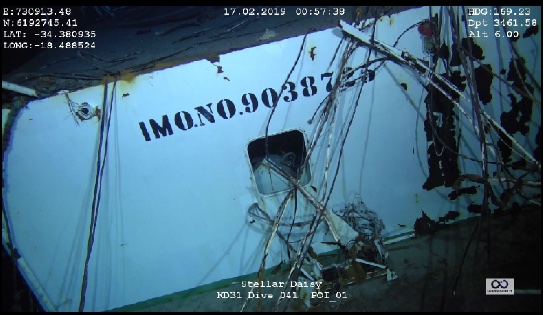
Polaris Shipping, one of South Korea’s largest shipowners, is enduring turbulent times, its CEO sentenced, a proposed takeover on the rocks, and a significant fleet sell-off.
The company’s CEO was sentenced yesterday to a three-year jail term for professional negligence in the sinking of the Stellar Daisy, a converted ore carrier that went down in the Atlantic off Uruguay in March 2017 with the loss of 22 lives.
The court ruled that the defendant failed to repair the ship in a timely manner by prioritising profits over the safety of the ship, citing structural defects resulting from neglect of hull maintenance and poor repairs as the cause of the Stellar Daisy’s rapid sinking in just five minutes.
Two other senior Polaris executives received two-year and one-year sentences at a court in Busan yesterday.
The giant 1993-built Stellar Daisy was one of the most high-profile ship casualties this century with the families of the bereaved fighting multiple legal battles to ascertain what happened that caused it to capsize and sink so fast. Just two of the 24 crew onboard survived.
A tribunal said last month Polaris Shipping installed an unauthorised wastewater storage device on the bottom of the ship and did not inspect or strengthen the ship’s hull.
The shipping company was supposed to conduct repairs to safely load cargo on the Stellar Daisy but let the ship set sail without reinforcement, the tribunal said.
The Marshall Islands flag issued its report into the sinking in April 2019, citing a catastrophic structural failure of the ship’s hull for the deadly disaster.
The ship – originally a VLCC – took on water and split in two very fast. Days later another 1993-built converted ore carrier belonging to Polaris had to reroute for Cape Town for repairs after a hull crack was discovered.
This then prompted the Busan-based owner to launch an urgent fleet-wide series of inspections, which in turn saw a 1992-built converted ore carrier also head off to Cape Town to be fixed and in the years that followed all the company’s old converted ships were sold off.
VLOCs were converted from single-hull very large crude carriers in previous decades as a result of the dry bulk supercycle and the IMO regulation which mandated that all single-hull tankers should be phased out by 2010.
With cheap and obsolete tanker tonnage in the market, investors eyed an opportunity to convert the ships into VLOCs and deploy them on long-term contracts of affreightment, often with a duration of 10 years.
Polaris was one of a host of Korean shipowners that were put up for sale over the past year.
The exclusive negotiation period between Polaris and its intended buyer Woori Private Equity Asset Management expired at the end of last month with local sources suggesting there was a very sizeable KRW200bn ($150m) difference in price negotiations.
Polaris is one of the world’s largest operators of newcastlemaxes and very large ore carriers with a fleet of 19 giant bulk carriers. Broking sources tell Splash that in recent days the company has completed the biggest bulk sale and purchase deal of the year to date.
Four 2020-2021 Chinese-built newcastlemaxes, namely Solar Quantum, Solar Pride, Solar Nova and Solar Oak, were put up for sale last week with multiple bids lodged.
Splash understands that the ships are now sold with an unnamed Greek owner tabling about $65m per ship.
